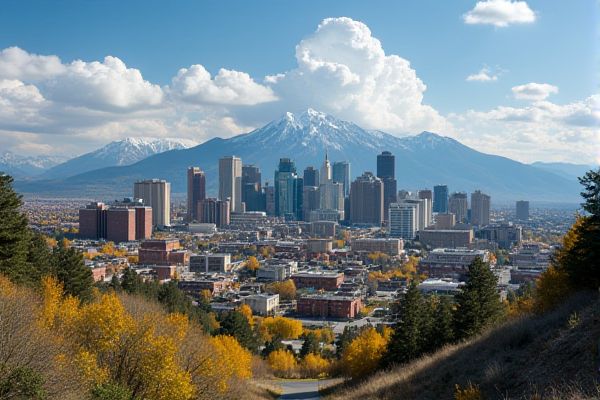
Internet and telecommunications options in Colorado: Major providers: CenturyLink, Xfinity, Rise Broadband. Fiber-optic availability in urban areas. Rural areas rely on satellite internet. Data caps common with many plans. Broadband expansion initiatives ongoing statewide. Competitive pricing in metropolitan regions. Wireless coverage strong in populated cities. Internet speeds vary by location. Options for bundling services to save money. Investment in 5G infrastructure increasing.
Major providers: CenturyLink, Xfinity, Rise Broadband.
In Colorado, major Internet providers include CenturyLink, which offers up to 940 Mbps speeds with 86% coverage and no annual contracts; Xfinity, with 77% coverage and a wide range of speed options; and Rise Broadband, which provides flexible residential and business internet packages. All three providers offer reliable connections, with CenturyLink and Xfinity being more widely available across the state.
Fiber-optic availability in urban areas.
In Colorado's urban areas, such as Denver, Aurora, and Colorado Springs, fiber-optic internet is widely available, with providers like Quantum Fiber offering speeds up to 8,000 Mbps. Nearly 100% of residents in these areas have access to high-speed internet, including fiber, with ongoing expansions to cover more neighborhoods and underserved areas. For more information about fiber availability in Denver neighborhoods, you can visit the Quantum Fiber website, which provides comprehensive coverage details.
Rural areas rely on satellite internet.
In rural areas of Colorado, satellite internet is often the only viable option due to the lack of wired connections. Providers like Viasat, Hughesnet, and Starlink offer satellite internet services with varying speeds and plans, although they can be more expensive and prone to weather-related disruptions compared to other types of internet connections. For more information, visit the Best Internet Providers in Colorado page.
Data caps common with many plans.
In Colorado, data caps are more common with cable and satellite internet providers. For example, Xfinity has a 1.2TB data cap, while Cox has a 1.28TB cap, with additional data blocks available for a fee. Many fiber internet providers, such as Quantum Fiber and Eastern Slope Technologies, offer unlimited data plans.
Broadband expansion initiatives ongoing statewide.
Colorado is undertaking significant broadband expansion initiatives, highlighted by a $113 million investment from the U.S. Treasury's Capital Projects Fund to connect approximately 19,000 homes and businesses, particularly in the south and southwest regions. This ambitious project is part of a larger effort, as the state has also been awarded over $826 million from the Broadband Equity, Access and Deployment (BEAD) program, which aims for 99% household connectivity by 2027. For more details on this endeavor, you can visit the StateScoop website, a resource that offers comprehensive insights into the broadband initiatives being executed across Colorado.
Competitive pricing in metropolitan regions.
In Colorado's metropolitan regions, competitive pricing for internet services is offered by providers such as Quantum Fiber, starting at $50 for 500Mbps, Xfinity with plans beginning at $20 for 150Mbps, and T-Mobile Home Internet at $50 for 245Mbps. Various options are available depending on the specific location and provider, ensuring residents can find the best Internet Providers suited to their needs.
Wireless coverage strong in populated cities.
In Colorado, wireless coverage is strong in populated cities, with providers like T-Mobile offering 4G LTE and 5G services, including T-Mobile Home Internet, which is available in many areas, especially in larger metro areas like Denver and Boulder. For more information on this, you can visit the Best Internet Providers in Colorado page. This resource offers insights into various internet options and their availability in different parts of the state, ensuring residents can access reliable and fast internet services.
Internet speeds vary by location.
Internet speeds in Colorado vary significantly by location, with median fixed broadband download speeds of 261.31 Mbps and mobile download speeds of 121.08 Mbps. These speeds differ widely across cities such as Denver, Boulder, and Greeley due to the availability of different internet technologies like cable, fiber, and DSL. For more detailed and up-to-date insights, the Speedtest website is a useful resource. Cities like Greeley, Centennial, and Westminster offer the fastest average download speeds, often exceeding 300 Mbps, while rural areas may rely on fixed wireless providers for slower but still available connections.
Options for bundling services to save money.
In Colorado, Mediacom offers bundled services that include digital HD TV, high-speed Internet with speeds up to 1 Gig, and unlimited nationwide calling, all compiled into one convenient monthly bill at competitive prices. This bundle provides a comprehensive package for entertainment, internet, and phone services, optimizing cost and convenience for users. For more details about their offerings, you can visit the Mediacom Colorado page.
Investment in 5G infrastructure increasing.
Colorado Springs has been at the forefront of 5G infrastructure investment, using the technology to enhance urban infrastructure and services such as trash collection, streetlight maintenance, and other smart city initiatives, highlighting the scalability and efficiency of 5G over traditional fiber installations. This investment has improved various public services and is part of a broader trend of leveraging 5G to upgrade connectivity and urban management.
